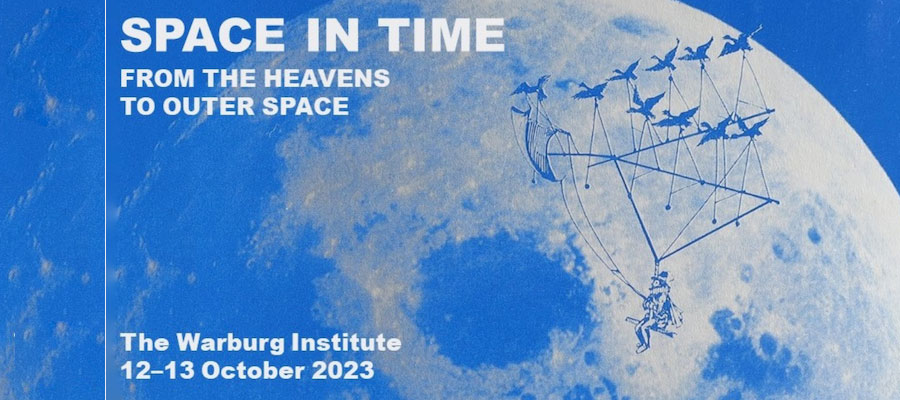Space in Time: From the Heavens to Outer Space, The Warburg Institute, October 12–13, 2023
Space in Time is a forum for new work in the long and global cultural history of the space beyond Earth, from the ancient heavens to modern outer space. While space history is a vibrant field of study, extending across the humanities and social sciences, it often breaks down along familiar geographical, disciplinary, and period-based boundaries. In particular, the field’s predominant interest remains in the twentieth and twenty-first centuries, especially following what is now increasingly referred to as the First Space Age. However, while outer space undeniably gains in interest in this period, this interest is preceded and underwritten by a cross-cultural history stretching as far back as the human imagination itself, much of it yet to be written.
Space in Time invites work sparking new cross-disciplinary, cross-cultural, and cross-period conversations in this field, encompassing, but not limited to, perspectives in the histories of art, astronomy, cosmology, geography, literature, philosophy, religion, science and technology, and intellectual and cultural history at large. Contributions challenging traditional approaches to outer space are particularly welcome, as well as those working across one or more established domains of inquiry and especially across the premodern/modern divide. The event is open to researchers of any disciplinary background, of any career stage, working in any regional or cultural tradition, from the ancient world to the present day.
Possible topics include, but are not limited to:
- Shifting depictions, descriptions, and understandings of spaces(s) above and around the earth, its domains and inhabitants, in different periods and contexts: e.g. the heavenly spheres, astrological houses, the apeiron, the sensorium of God, a sphere whose circumference is nowhere, outer space, deep space, etc. What cosmological, ontological, epistemological, theological, metaphysical, aesthetic, ethical concerns have shaped representations of superlunary space?
- New directions in space history. Is it possible to write a history of outer space beyond ‘official’ histories of science? How have different senses and media informed perceptions and imaginations of outer space? How have terrestrial geopolitics, intercultural relations, and geographical imaginations shaped extra-terrestrial imaginations?
- Contrasting and complementary perspectives on outer space or the superlunary regions—e.g. ‘enchanted’ / ‘disenchanted’, local / global, popular / elite, timeless / historical.
- The Second / Third Space Age in historical perspective. How does a long cultural history of space inform the recent resurgence of public and private space programmes, controversial developments in space industry, space junk, and space tourism, and their complex political and cultural dynamics?
- Sounds of and from outer space, from the celestial music of the heavenly spheres to the signals of early satellites’ radio beacons, radiotelescopy, and the first sound recordings from Mars.
- Space, citizen science, and amateur initiatives: e.g. IGY Moonwatchers, radio amateurs, amateur astronomy, rocketry, SETI, diverse social and historical contexts of astrology, etc.
- Long history of science fiction and speculative voyages beyond Earth.
- Space in classical tradition / classical tradition in space.
Space in Time will be a ‘hybrid’ event, combining in-person and online participation. Limited financial support may be available for early-career presenters attending in person.
